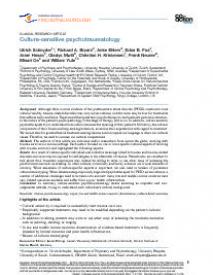Culture-sensitive psychotraumatology
Background: Although there is some evidence of the posttraumatic stress disorder (PTSD) construct’s cross cultural validity, trauma-related disorders may vary across cultures, and the same may be true for treatments that address such conditions. Experienced therapists tailor psychotherapy to each patient’s particular situation, to the nature of the patient’s psychopathology, to the stage of therapy, and so on. In addition, culture-sensitive psychotherapists try to understand how culture enhances the meaning of their patient’s life history, the cultural components of their illness and help-seeking behaviors, as well as their expectations with regard to treatment. We cannot take for granted that all treatment-seeking trauma survivors speak our language or share our cultural values. Therefore, we need to increase our cultural competencies.
Methods: The authors of this article are clinicians and/or researchers from across the globe, working with trauma survivors in various settings. Each author focused on one or more specific cultural aspects of working with trauma survivors and highlighted the following aspects.
Results: As a result of culture-specific individual and collective meanings linked to trauma and trauma-related disorders survivors may be exposed to (self-)stigma in the aftermath of trauma. Patients who are reluctant to talk about their traumatic experiences may instead be willing to write or use other ways of accessing the painful memories such as drawing. In other cultures, community and family cohesion are crucial elements of recovery. While awareness of culture-specific aspects is important, we also need to beware of premature cultural stereotyping.When disseminating empirically supported psychotherapies for PTSD across cultures, a number of additional challenges need to be taken into account: many low and middle income countries have very limited resources available and suffer from a poor health infrastructure.
Conclusions: In summary, culture-sensitive psychotraumatology means assuming an empathic and nonjudgmental attitude, trying to understand each individual’s cultural background.
In: European journal of psychotraumatology, ISSN 2000-8066 | 7 | juli | 31179
http://dx.doi.org/10.3402/ejpt.v7.31179


